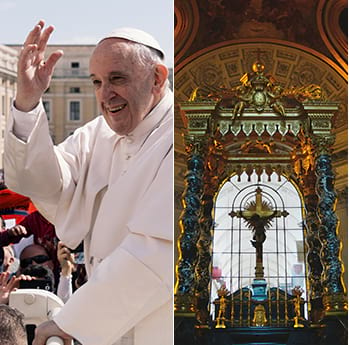Mary Magdalene is a key figure in early Christianity. Present in the four Gospels, she occupies a unique position, being a privileged witness to the resurrection. The East loves to call her “apostle of the apostles.” Tradition very quickly made her, especially after the fourth century, a sinner and a prostitute, identifying her with anonymous women in the Gospels, such as the forgiven sinner of Luke 7:36-50. But nothing in the Gospels supports such an identification.
So, what do we know about her? Very little, in truth! She was from Magdala, a village on the shores of Lake Tiberias. Some interesting information is given to us by Luke when he gives us the list of women following Jesus from Galilee at Luke 8:1-3. Luke presents her within a group that is close to the Twelve: “There were with him the Twelve and some women who had been cured of evil spirits and infirmities: Mary, called Magdalene, from whom seven demons had come out; Joanna, wife of Herod’s steward, Chuza; Susanna and many others, who served them with their resources” (Luke 8:1b-3). This information is also found in Mark 16:9, with a variation of the verb used with regard to the demons (“Jesus appeared first to Mary Magdalene, out of whom he had driven seven demons”), but the vast majority of exegetes believe that the anonymous author of the canonical ending of Mark (described as “longer”) refers here to the text of Luke. Mary was therefore from Magdala and probably well-to-do and therefore independent.
According to Luke, she had been exorcised by Jesus. But why “seven demons”? Common sense, as well as the significance of numbers in the biblical tradition, makes us think that the diabolic possession was of an exceptional and dramatic intensity. Only one contemporary text , the Testament of Reuben, a para-testamentary text, mentions “seven spirits”: “Hear, my children, what I saw when I did penance concerning the seven spirits of deception; seven spirits were distributed to man, they are responsible for the misdeeds of youth” (Testament of Reuben, 2,1).[1]
What is certain is that the mention of the seven spirits is not a familiar reference at the time. Yet, Luke tells us shortly thereafter, and in the context of a controversy over his exorcisms, a parable of Jesus mentioning “seven spirits that were more evil” (Luke 11:26). Can a connection perhaps be made between these two texts, since they are the only mentions of “seven spirits or demons” in the entire Gospel? Many authors have been quick to do so. Thus one of the leading commentators on Luke, François Bovon, writes: “Possession by seven demons is, for Jesus, as in general for the Jews of his time, a particularly serious possession (the inauthentic conclusion of Mark’s Gospel, Mark 16:9, must depend on this recollection).”[2] Many cite this parallelism in footnotes, without going further.
This article is reserved for paid subscribers. Please subscribe to continue reading this article
Subscribe
Welcome to
La Civiltà Cattolica !
This article is reserved for paid subscribers
Please login or subscribe to continue reading this article
























